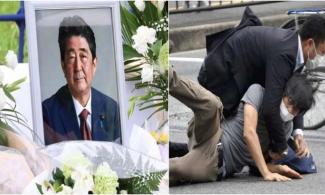
Tetsuya Yamagami was detained immediately after the former Japanese premier was gunned down last July while giving a campaign speech in the western city of Nara.
The alleged killer of former prime minister Shinzo Abe was indicted by Japanese prosecutors on Friday after a lengthy psychiatric review found him fit to stand trial, local media said.
Tetsuya Yamagami was detained immediately after the former Japanese premier was gunned down last July while giving a campaign speech in the western city of Nara.
Nara District Public Prosecutors Office indicted Tetsuya Yamagami, 42, on murder charges as well as for violating gun laws after concluding a roughly six-month psychiatric evaluation, the report said.
In a crime that shocked the world, Yamagami was arrested on the spot on July 8 after allegedly shooting Abe with a handmade gun while the former premier was giving a speech at an election campaign in the western city of Nara.
He reportedly held a grudge against the controversial Unification Church for impoverishing his family as it persuaded his mother to donate around 100 million yen ($774,700) and blamed Abe for promoting the religious organisation.
Nara District Court spokesman Kenichiro Nomura told AFP that Yamagami faces charges of murder and violation of arms control laws. He could face the death penalty if convicted.
Yamagami has admitted to killing Abe, according to local media, and images taken at the scene show him holding and firing an apparently homemade weapon.
He reportedly targeted Abe over the former leader's ties to the Unification Church, the global sect whose members are sometimes referred to as "Moonies".
Yamagami is believed to have resented the church over large donations his mother made that bankrupted his family.
Abe, who was given a rare state funeral, was not a member of the church but had addressed an affiliated group, as have other well-known speakers such as Donald Trump.
Founded in Korea in 1954 by Sun Myung Moon, the church rose to global prominence in the 1970s and 80s.
The group, officially known as the Family Federation for World Peace and Unification, has denied wrongdoing and has pledged to prevent "excessive" donations from members.
Investigations after Abe's death revealed close ties between the church and many conservative ruling lawmakers, including a minister who has resigned.
The assassination also increased scrutiny on Abe's alleged long-standing family ties to the sect – especially those of his grandfather, former prime minister Nobusuke Kishi, who was photographed shaking hands with Moon.
The revelations angered the public and helped push approval ratings for Prime Minister Fumio Kishida's administration to new lows.
Kishida has ordered a government investigation that could see the Unification Church lose its tax-exempt status in Japan, although it could still continue to operate.
His government has also passed legislation tightening rules around religious donations.